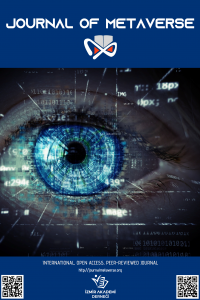A Second Life for Educators: A Hybrid Extended Reality Education Between Zuckerberg’s Vision and Educational Researchers’ Imaginary
extended reality, education, metaverse, discourse, future imaginaries
A Second Life for Educators: A Hybrid Extended Reality Education Between Zuckerberg’s Vision and Educational Researchers’ Imaginary
extended reality, metaverse, education, discourse, future imaginaries,
___
- Vikoulov, Alex. 2019. “The Syntellect Hypothesis: Five Paradigms of the Mind's Evolution (Abstract, Table of Contents, Foreword, Prologue, and Overview).” The Syntellect Hypothesis: Five Paradigms of the Mind's Evolution (ISBN: 978-0578451206), January.
- Muldoon, James. 2022. “Private Power and Public Infrastructure.” Platform Socialism: How to Reclaim Our Digital Future from Big Tech, 62-79. Pluto Press. https://doi.org/10.2307/j.ctv272454p.8.
- Park, Sang-Min, and Young-Gab Kim. 2022. “A Metaverse: Taxonomy, Components, Applications, and Open Challenges.” IEEE Access 10: 4209–51. https://doi.org/10.1109/ACCESS.2021.3140175.
- Brown, Nik, Brian Rappert, Andrew Webster, and Stewart Russell. 2004. “Contested Futures: A Sociology of Prospective Techno-Science.” Technology Analysis and Strategic Management 16 (4): 563–66.
- Hilgartner, Stephen et al. 2015. Science and Democracy: Making Knowledge and Making Power in the Biosciences and Beyond. Routledge. EBSCOhost, https://search-ebscohost-com.proxy.uba.uva.nl/login.aspx?direct=true&db=nlebk&AN=961735&site=ehost-live&scope=site.
- Haupt, Joachim. 2021. “Facebook Futures: Mark Zuckerberg’s Discursive Construction of a Better World.” New Media & Society 23 (2): 237–57. https://doi.org/10.1177/1461444820929315.
- Pasquale, Frank. 2016. “Two Narratives of Platform Capitalism.” Yale Law & Policy Review 35: 309.
- Egliston, Ben, and Marcus Carter. 2021. “Critical Questions for Facebook’s Virtual Reality: Data, Power and the Metaverse.” Internet Policy Review 10 (4). https://doi.org/10.14763/2021.4.1610.
- Harari, Yuval N. 2018. 21 Lessons for the 21st Century. First edition. New York: Spiegel & Grau.
- Jasanoff, Sheila. 2015. “Future Imperfect: Science, Technology, and the Imaginations of Modernity,” in S. Jasanoff and S.-H. Kim, eds, Dreamscapes of Modernity: Sociotechnical Imaginaries and the Fabrication of Power. Chicago: The University of Chicago Press.
- Lessig, Lawrence. 2004. Free Culture: How Big Media Uses Technology and the Lawto Lock Down Culture and Control Creativity. New York: The Penguin Press.
- Keller, Reiner. 2011. “The Sociology of Knowledge Approach to Discourse (SKAD).” Human Studies 34 (1): 43–65. https://doi.org/10.1007/s10746-011-9175-z.
- Foucault, Michel. 1974. The Archaeology of Knowledge. Social Science Paperbacks 149. London: Tavistock Publications.
- Berger, Peter L, and Thomas Luckmann. 1971. The Social Construction of Reality. Repr. London.
- Zuckerberg, Mark. 2021. “The Metaverse Will Be Social.” Meta Platforms Inc. Video, 1:17:27. Accessed March 10, 2022. https://about.facebook.com/meta/.
- Liao, Christine L. 2008. “Avatars, Second Life®, and New Media Art: The Challenge for Contemporary Art Education.” Art Education 61 (2): 87–91. https://doi.org/10.2307/27696282.
- González Crespo, Rubén, Roberto Ferro Escobar, Luis Joyanes Aguilar, Sandra Velazco, and Andrés G. Castillo Sanz. 2013. “Use of ARIMA Mathematical Analysis to Model the Implementation of Expert System Courses by Means of Free Software OpenSim and Sloodle Platforms in Virtual University Campuses.” Expert Systems with Applications 40 (18): 7381–90. https://doi.org/10.1016/j.eswa.2013.06.054.
- Kye, Bokyung, Nara Han, Eunji Kim, Yeonjeong Park, and Soyoung Jo. 2021. “Educational Applications of Metaverse: Possibilities and Limitations.” Journal of Educational Evaluation for Health Professions 18 (December). https://doi.org/10.3352/jeehp.2021.18.32.
- Stephenson, Neal. 2008. Snow Crash. A Bantam Spectra Book. New York: Bantam Books.
- “Meta Reports Fourth Quarter and Full Year 2021 Results.” n.d. Accessed May 8, 2022. https://investor.fb.com/investor-news/press-release-details/2022/Meta-Reports-Fourth-Quarter-and-Full-Year-2021-Results/default.aspx.
- Marcos, Coral Murphy. 2022. “Meta Plunges and Sets off Wall Street’s Worst Drop in Nearly a Year.” The New York Times, February 3, 2022, sec. Business. https://www.nytimes.com/2022/02/03/business/stock-market-today.html.
- Xu, Ling. 2021. “Why Did Facebook Change Its Name?” Dedao Article, September 23, 2021. https://www.dedao.cn/share/course/article?id=92GB1my8okM5VMn0MyJWgNnEe4Z73r.
- Meta Platforms Inc. n.d. “What We Build.” Accessed March 15, 2022. https://about.facebook.com/technologies/oculus/.
- Yayın Aralığı: Yılda 2 Sayı
- Başlangıç: 2021
- Yayıncı: İzmir Akademi Derneği
The Metaverse or Meta-Awareness?
Kemal Gökhan NALBANT, Sevgi AYDIN
The Age Beyond Sports: User Experience in the World of Metaverse
Gülsüm DEMİR, Metin ARGAN, Halime DİNÇ
Use of Metaverse Technology in Education Domain
Khandaker Raiyan RAHMAN, Sholaiman Khan SHİTOL, Md Sohidul ISLAM, Kh. Tanveer IFTEKHAR, Pranto SAHA
Jason Robert RAMESHWAR, Graham KİNG
Metaverse: A Potential Virtual-Physical Ecosystem for Innovative Blended Education and Training
Abdul SYUKUR, Pulung Nurtantio ANDONO, Khafiizh HASTUTİ, Arry Maulana SYARİF
